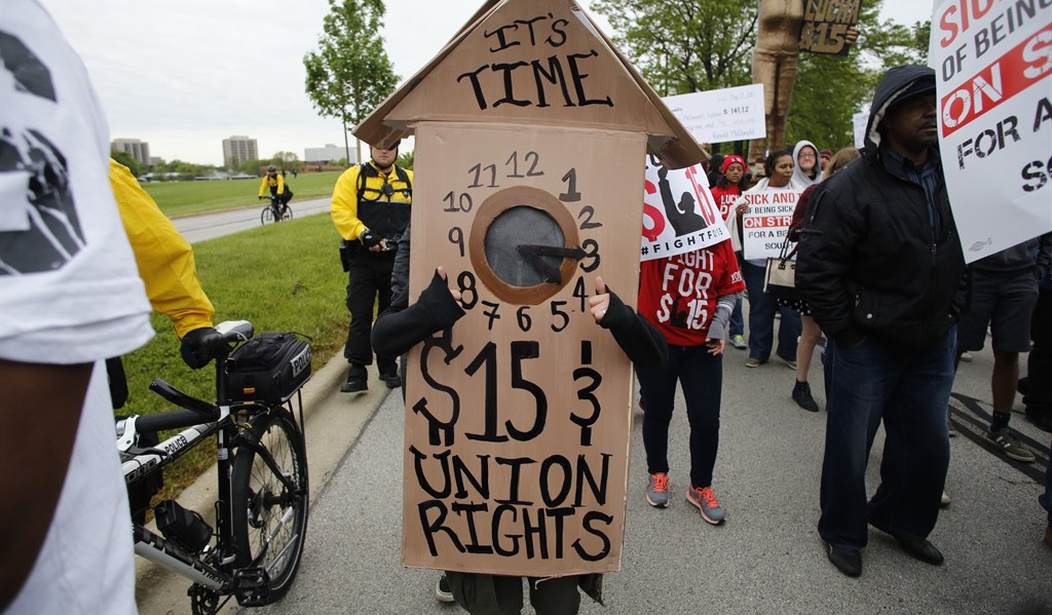Advertisement
According to a recent, but underreported, Gallup poll, a whopping 86 percent of Americans "say the economy will be extremely important or very important to their vote next year, a significantly higher percentage than for any other issue."
To be sure, Clinton will have a pile of big money for her campaign, well in excess of $1 billion, plus the full weight of the Democratic Party's hefty establishment behind her. But her chances of being president will depend on how the Obama economy does this year and next. And thus far the early economic data is dismal.
Democratic insiders tell me the slipping economy is one of the chief worries being hotly debated in closed strategy meetings. And this week's grim economic reports have only heightened their concerns.
The economy isn't just slowing down, it is contracting, according to economic estimates and forecasts in the first and second quarters, escalating fears of possible double-dip recession.
Factory orders for big ticket, durable goods fell last month. Retail sales have been lackluster as Americans kept a tight grip on their wallets. Job growth continues to be tepid in what has increasingly become a part time, low paying economy, where too many college grads can't find work commensurate with their educational levels, and are forced to take counter jobs and move back home with their parents.
The underemployment rate for college graduates forced to take jobs below their skill levels now stands at nearly 45 percent, according to an analysis by the Federal Reserve Bank of New York.
Recommended
Advertisement
As for the overall economy, the Commerce Department reported that the nation's gross domestic product, or GDP, barely grew by 0.2 percent. In other words, it had for all practical purposes stopped growing.
But a revised first quarter GDP report which will come out Friday was expected to show that the economy did even worse than first reported, and actually shrank in the first three months of this year, according to top economic forecasters.
Some of the reasons for the weaker revisions: slack retail sales and a mediocre jobs report in March.
"We expect first-quarter GDP growth to be revised down to -1.0 percent on downward revisions to net exports and the change in inventories," according to an economic analysis at IHS Global Insight.
Economists are divided on the economic growth rate in the second quarter, but many think it will be disappointing, too.
"Midway through the second quarter, the economy has not built up much momentum. That matters more than the first quarter growth numbers," IHS analysts said.
Obviously, the economy isn't operating anywhere near full throttle. U.S. industrial production declined for the fifth consecutive month in April, and manufacturing output was flat, the Federal Reserve reported earlier this month.
At the same time, sales of existing U.S. homes in April fell 3.3 percent, reflecting a weakened job market, lower incomes, rising home prices, and fewer listings.
The Obama administration, and the liberal news media, make much of the unemployment rate falling ever closer to 5 percent. But the job numbers, as reported, leave out the longterm unemployed who aren't counted, and either play down or ignore the growing size of the underemployed.
Advertisement
University of Maryland business economist Peter Morici puts the total for these neglected job market sectors at "20 million unemployed and underemployed prime working-age American adults."
Clinton has yet to lay out an economic agenda beyond class warfare attacks on "the top one percent" and blindly adopting Obama's harmful proposal to raise the minimum wage to $15 an hour.
Years of economic analysis have shown that small and midsize businesses respond by cutting their payroll, and thus destroying critical entry level jobs and the training that comes with them.
Want proof? Check out what happened in Seattle and San Francisco "where restaurants and other businesses either closed or reduced hours for workers as new laws hiked the minimum wage to unrealistic levels," Morici says.
But anyone who needs further proof that the mediocre, job-challenged Obama economy, now in the seventh year of its so-called recovery, isn't working, need look no further than the deeply divided fight at the Federal Reserve over when to begin raising interest rates.
The minutes of last month's Fed meeting revealed that "many" board members agreed the economy wasn't strong enough to handle any hike in interest rates in June.
Fed Chair Janet Yellen dismissed the weak economic data, expressing confidence that the recovery was still on track, and reaffirmed that the Fed would eventually raise rates this year.
But the central bank's been notorious for its optimistic economic forecasts, only to postpone any action on raising its benchmark rates that the Fed has kept near zero.
Advertisement
So this time, even Yellen was noticeably reticent in the face of persistently weak economic data that shows no sign of going away anytime soon.
"I am describing the outlook that I see as most likely, but based on many years of making economic projections, I can assure you that any specific projections that I write down will turn out to be wrong, perhaps markedly so," she said in a speech in Rhode Island last week.
Is Yellen pulling her bets on the economy and thinking, perhaps, that it will need the Fed's life support systems for the president's last year and a half?
Obama's crippled economy is actually shrinking, even after trillions of dollars have been spent to prop it up. And all of the available data seems to suggest it is going to get worse, a lot worse.

























Join the conversation as a VIP Member